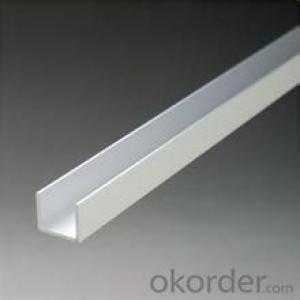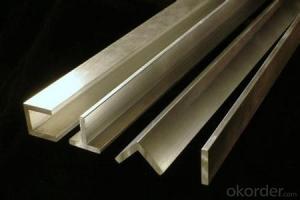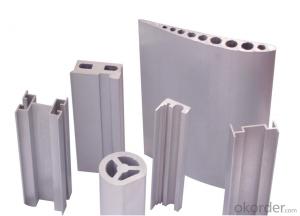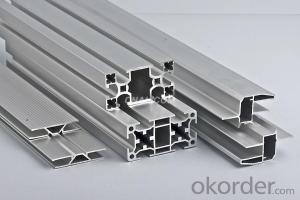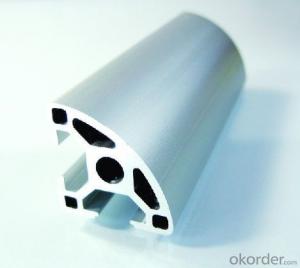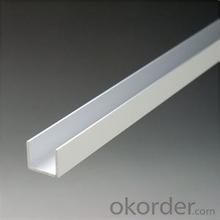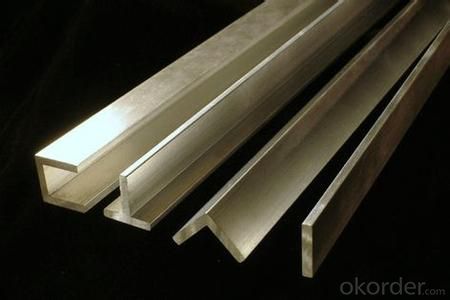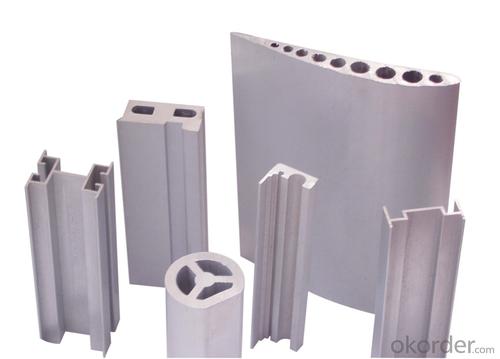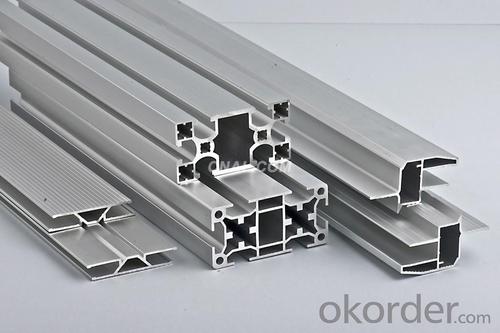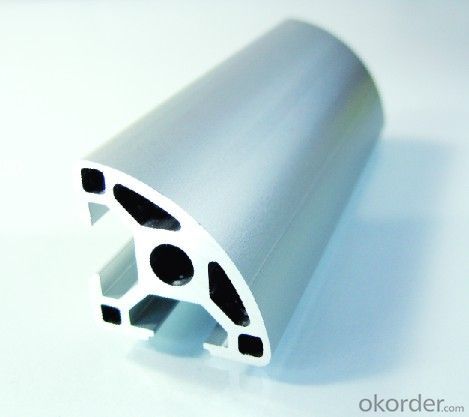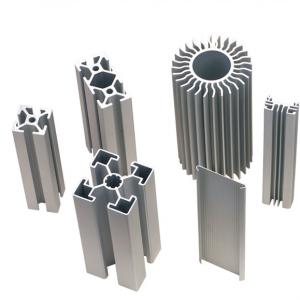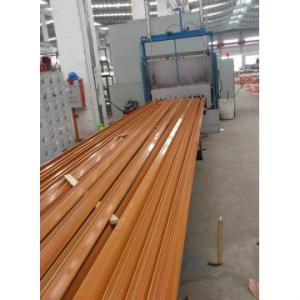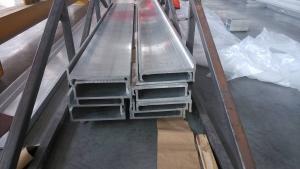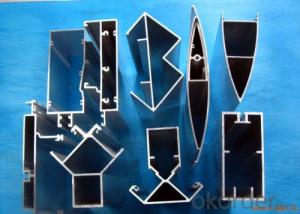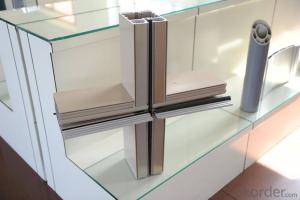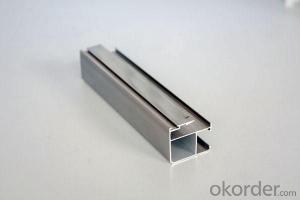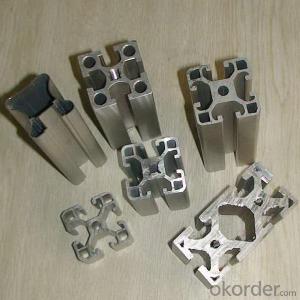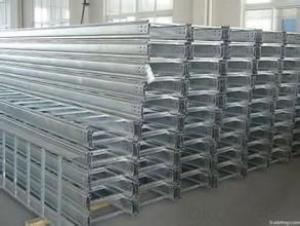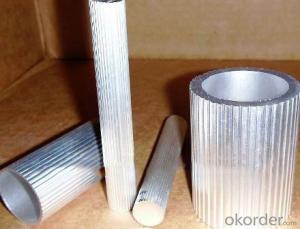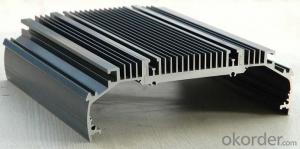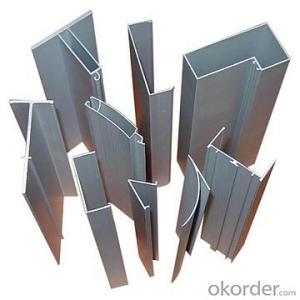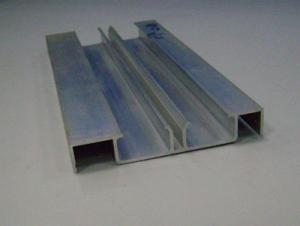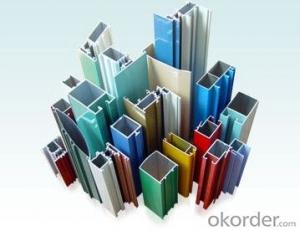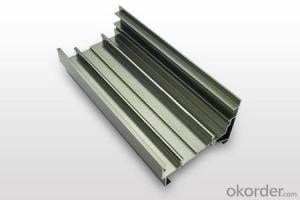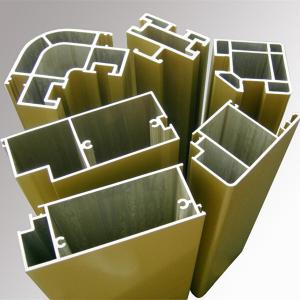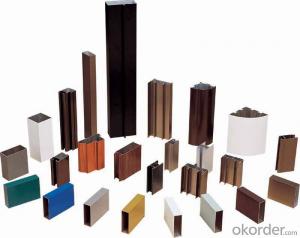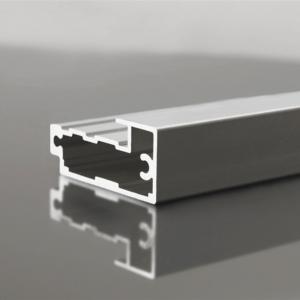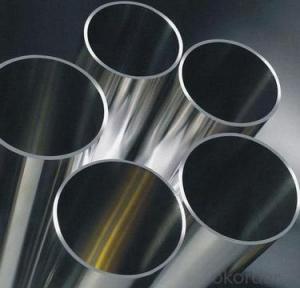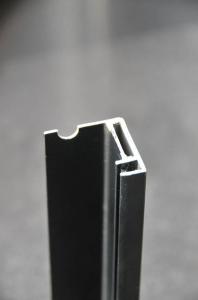Aluminum Extrusion Profiles from China - Various Surface Treatment Industrial Aluminium Profile Extrusion
OKorder Service Pledge
OKorder Financial Service
You Might Also Like
Aluminium is a relatively soft, durable, lightweight, ductileand malleablemetalwith appearance ranging from silvery to dull gray, depending on the surfaceroughness. It is nonmagnetic and does not easily ignite. A fresh film ofaluminium serves as a good reflector (approximately 92%) of visible lightand an excellent reflector (as much as 98%) of medium and far infraredradiation. The yield strength of pure aluminium is 7–11 MPa,while aluminium alloys have yield strengths ranging from200 MPa to 600 MPa. Aluminium has about one-third the densityand stiffness of steel. It is easily machined,cast, drawn and extruded.
Features:
Material | Alloy 6063,6061,6005or according to customer’s choice |
Temper | T3, T4, T5, T6 |
Surface | Anodize, electrophoresis, powder coating, PVDF coating, wood grain painting, matted, etc. |
Length | Coating 6.5 meters, Anodizing 6.5 meters, Mill finish 5 meters |
Application | Industrial, electrical equipment(TV set, air conditioner, refrigerator, computer), decoration,construction, transportation |
Custom Made | We can package following with customer's request. |
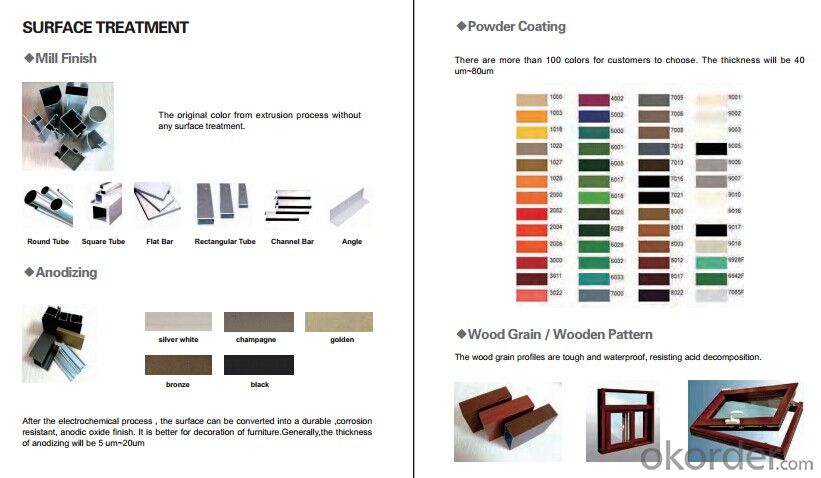
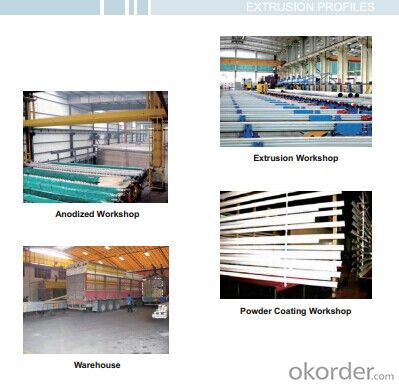
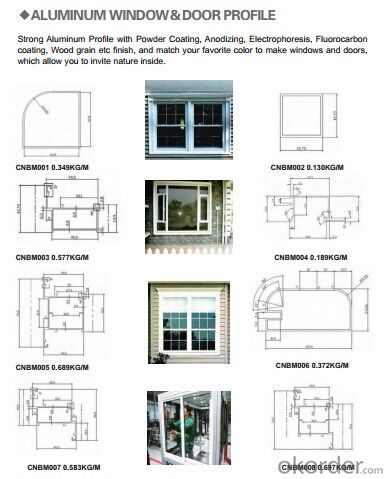
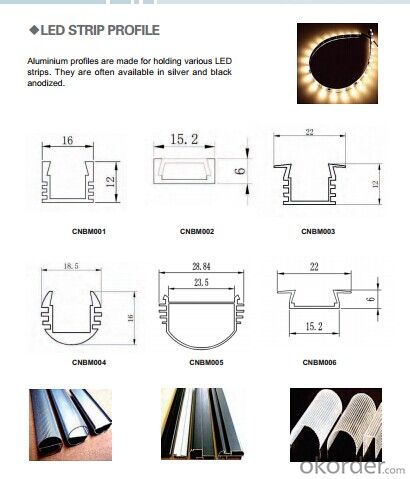
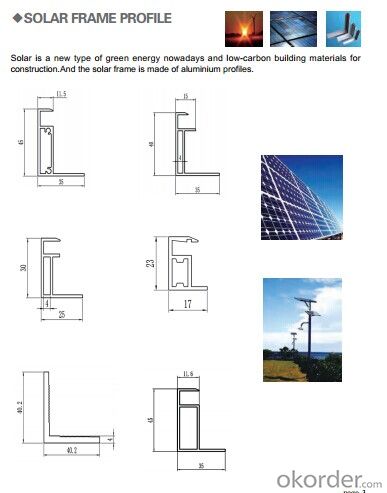
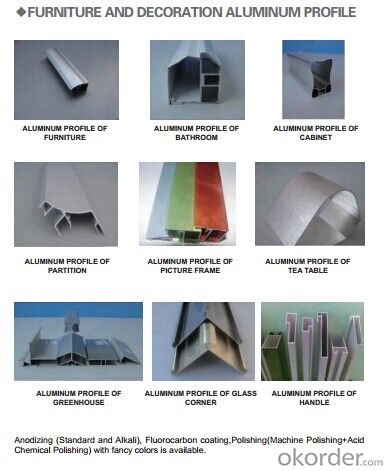
- Q: What are the different surface treatments for aluminum profiles?
- Aluminum profiles can be treated with various surface treatments, each offering its own advantages and characteristics. Anodizing is a popular method that involves forming a protective oxide layer on the aluminum surface. This enhances the corrosion resistance and allows for the aluminum to be dyed in different colors, creating a sleek and modern finish. Another commonly used technique is powder coating, where a dry powder paint is applied and cured under heat to create a durable coating. This provides excellent resistance to scratching, chipping, and fading, making it perfect for applications that require long-lasting and vibrant finishes. Painting is a versatile option that allows for a wide variety of color choices and finishes. Aluminum profiles can be painted using different methods, such as spray painting or electrostatic coating. This creates a smooth and attractive appearance suitable for both indoor and outdoor use. For a distinctive and decorative look, brushing is a technique that involves brushing the aluminum surface with a wire brush or abrasive material. This creates a textured finish, often chosen for architectural and design applications that require a unique and stylish appearance. Ultimately, the choice of surface treatment for aluminum profiles depends on the specific requirements of the application. Factors such as corrosion resistance, durability, aesthetic appeal, and functionality all play a vital role in determining the most suitable surface treatment method.
- Q: Can someone give me a direction? Thank you
- Look where you are and where you are. There are various directions for development, such as bags and so on, bathroom..
- Q: Are aluminum profiles resistant to impact or vibration?
- Yes, aluminum profiles are generally resistant to impact and vibration due to their high strength-to-weight ratio and excellent damping properties.
- Q: What screws do you use for aluminum alloy profiles?
- Aluminum alloy profiles are generally: with electric nails, self tapping screws fixed. Do not use ordinary screws, tools should also be chosen.Self tapping screws are used for non metal or soft metal, without backing holes and tapping; self tapping screws are pointed, so that they can be self tapping; ordinary screws are flat head, and the thickness is the same.Classification of aluminium alloy sections by use:Construction aluminum profiles (divided into two types of doors and windows and curtain wall).Radiator aluminum profile.General industrial aluminum: mainly used in the manufacture of industrial production, such as automation equipment, covering the skeleton and the custom mold machinery and equipment according to their own requirements, such as assembly line conveyor belt, hoisting machine, glue machine, testing equipment, shelves and so on, electronic machinery industry and clean room with.Aluminum alloy profile of railway vehicle structure: mainly used for rail vehicle body manufacturing.
- Q: What is the difference between 6063-T5 and 6061-T6 aluminum profiles?
- 6063 Aluminum Alloy belongs to Aluminum Alloy heat treatment, the main alloying elements as magnesium and silicon, the main strengthening phase is Mg2Si, with moderate strength, high corrosion resistance, no stress corrosion cracking tendency, good welding performance and corrosion resistance of weld zone constant etc.. The aluminum alloy has wide quenching range and low sensitivity to quenching temperature, and the thin-wall parts can be realized by wind quenching (strong wind cooling). Alloys are widely used in the frame and load-bearing panels of the construction and automotive industries. There is a relatively large tendency of over ageing in the welding process of this alloy. The direct reason is that the strengthening phase has been changed by the temperature.
- Q: How do aluminum profiles contribute to the reduction of noise pollution?
- Aluminum profiles contribute to the reduction of noise pollution through their inherent properties of sound insulation and dampening. The use of aluminum profiles in various applications, such as windows, doors, and façades, helps to create a barrier against external noise sources. The material's high density and rigidity effectively absorb and block sound waves, minimizing their transmission into indoor spaces. Additionally, aluminum profiles can be combined with sealing and gasketing systems to further enhance their noise reduction capabilities.
- Q: How do aluminum profiles perform in terms of static electricity discharge?
- Aluminum profiles have excellent static electricity discharge properties. Due to their high electrical conductivity, aluminum profiles are effective in dissipating static charges that may build up on their surface. This helps to prevent the accumulation of static electricity, which is particularly important in industries where electrostatic discharge can cause damage to sensitive electronic components or pose a risk to safety. The conductivity of aluminum profiles allows for the easy grounding of any static charges, ensuring a safe working environment. Additionally, aluminum profiles are often used in the construction of ESD (electrostatic discharge) protective equipment and structures, further highlighting their effectiveness in managing static electricity. Overall, aluminum profiles are highly reliable in terms of static electricity discharge, making them a preferred choice in various industries where static control is necessary.
- Q: Are aluminum profiles durable?
- Yes, aluminum profiles are highly durable. Aluminum is known for its exceptional strength-to-weight ratio, making it an ideal choice for a variety of applications where durability is essential. Aluminum profiles are resistant to corrosion, which means they can withstand exposure to harsh environmental conditions without deteriorating. Additionally, aluminum profiles have excellent structural integrity, allowing them to withstand heavy loads and impacts without bending or breaking. This makes them highly reliable and long-lasting, making them a popular choice in industries such as construction, automotive, aerospace, and many more.
- Q: How do you ensure proper insulation with aluminum profiles?
- To ensure proper insulation with aluminum profiles, there are several key steps that can be taken. 1. Thermal break technology: Utilize aluminum profiles with thermal break technology. This involves the addition of a non-conductive material, such as polyamide, between the inner and outer aluminum sections. This helps to reduce heat transfer and improve insulation properties. 2. Proper sealing: Ensure that the aluminum profiles are properly sealed when installed. This includes using high-quality sealants and gaskets to prevent air leakage and create a tight seal. Pay attention to corners, joints, and any other potential areas of air infiltration. 3. Double or triple glazing: When using aluminum profiles for windows or doors, opt for double or triple glazing. This involves using multiple layers of glass with an air or gas-filled space in between. This extra layer of insulation helps to reduce heat transfer and improve energy efficiency. 4. Insulated frames: Consider using aluminum profiles with insulated frames. These frames have a layer of insulation material within them, further reducing heat transfer and improving thermal performance. 5. Thermal insulation accessories: Utilize additional thermal insulation accessories, such as thermal breaks, insulation tapes, or foam inserts. These can be installed within the aluminum profiles to enhance insulation properties and minimize thermal bridging. 6. Proper installation techniques: Ensure that the aluminum profiles are installed correctly by following manufacturer guidelines and recommendations. This includes using appropriate fasteners, avoiding gaps or spaces, and ensuring proper alignment and fit. By implementing these measures, proper insulation can be achieved with aluminum profiles, resulting in improved energy efficiency, reduced heat loss or gain, and increased comfort in buildings.
- Q: Is it feasible to recycle aluminum profiles and what factors affect the recycling process?
- <p>Yes, aluminum profiles can be recycled easily. Aluminum is one of the most recycled materials globally due to its low melting point, which requires less energy for recycling compared to other metals. The recycling process involves melting the aluminum, which can be done at temperatures significantly lower than those needed for other metals. Additionally, aluminum retains its properties even after multiple recycling cycles, making it an ideal material for sustainable use. The recycling rate of aluminum is high, and it contributes to energy savings and reduced environmental impact. However, the ease of recycling can be affected by factors such as the presence of impurities, the complexity of the profile shapes, and the efficiency of collection systems.</p>
Send your message to us
Aluminum Extrusion Profiles from China - Various Surface Treatment Industrial Aluminium Profile Extrusion
OKorder Service Pledge
OKorder Financial Service
Similar products
Hot products
Hot Searches
Related keywords
